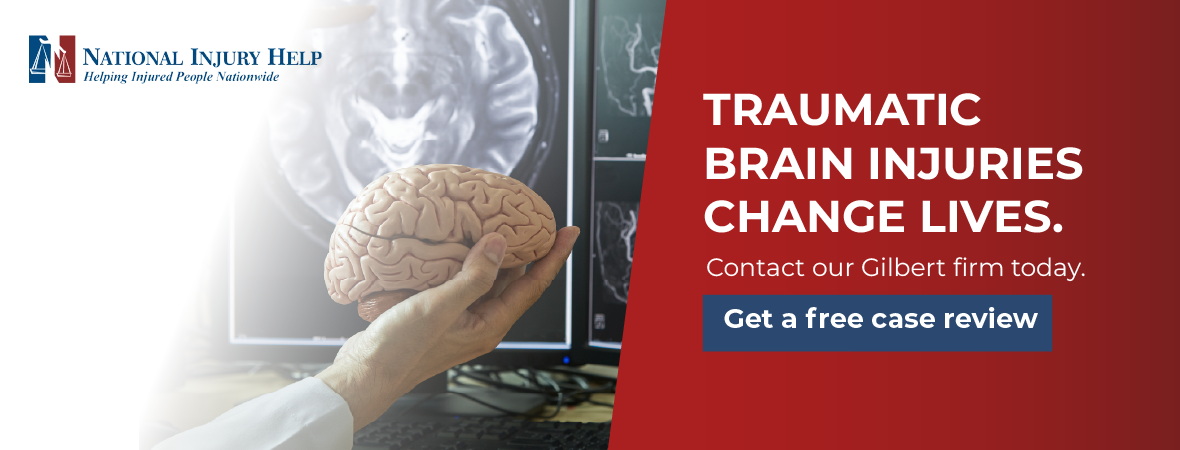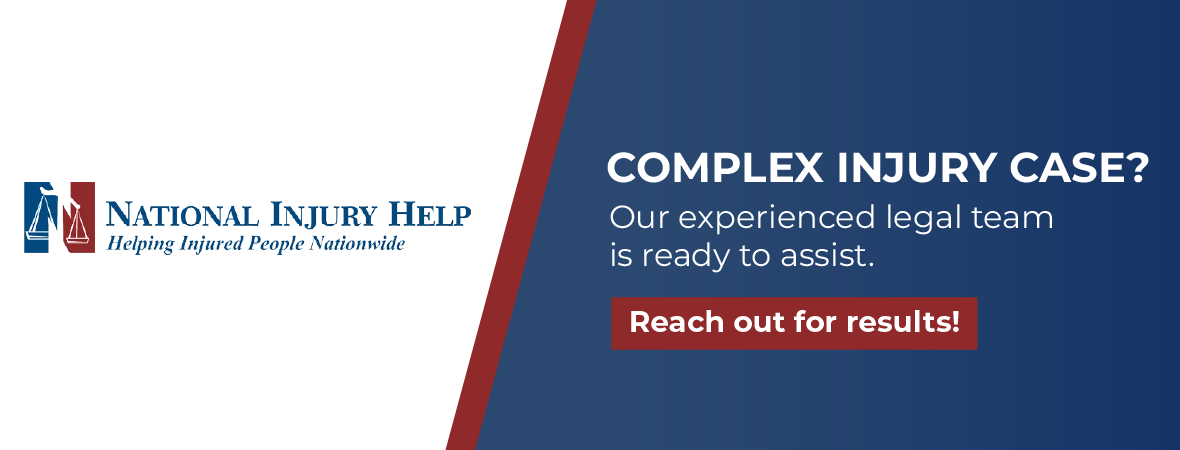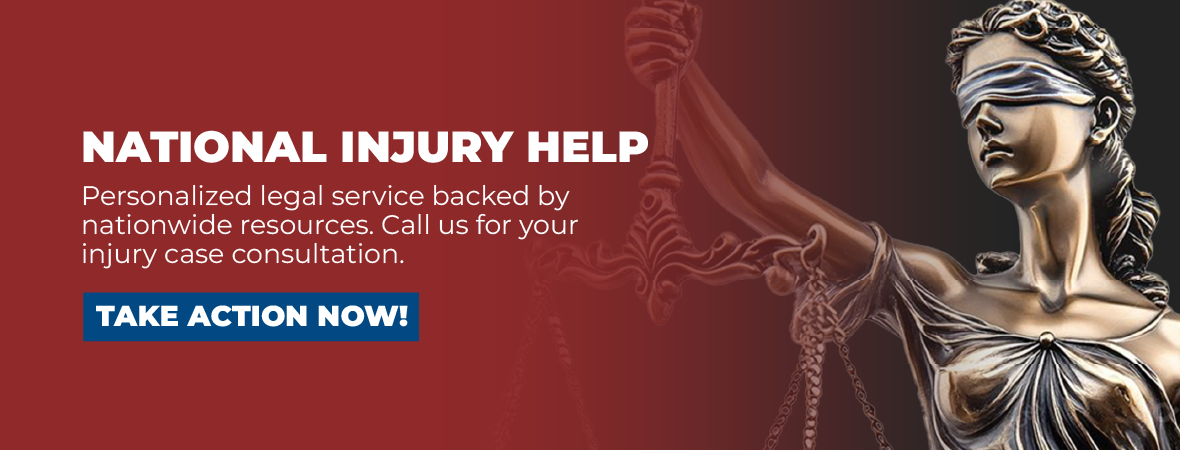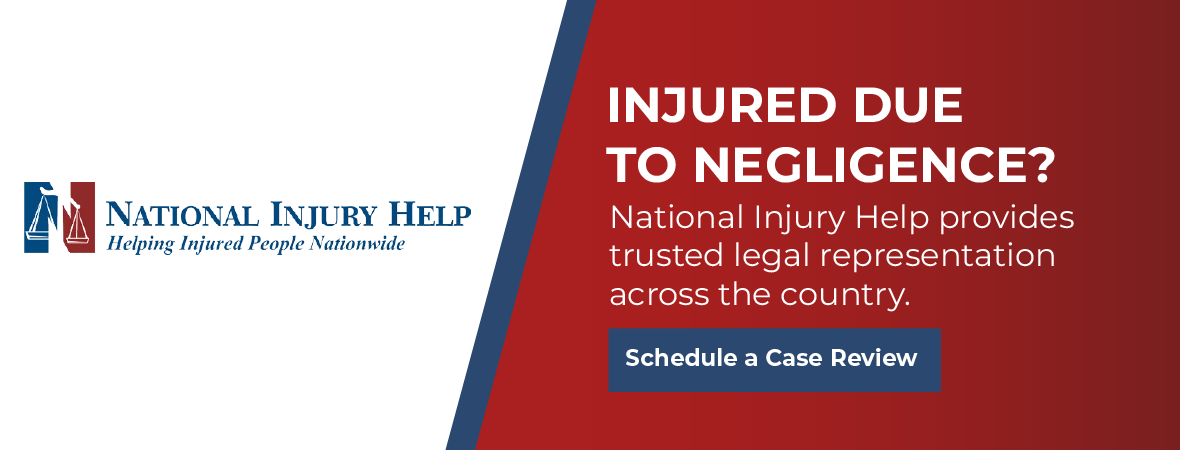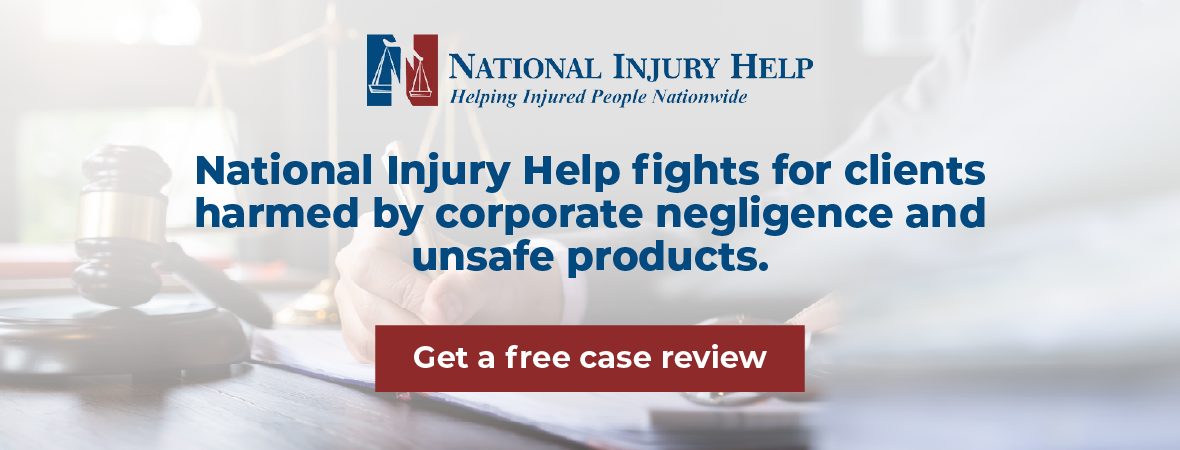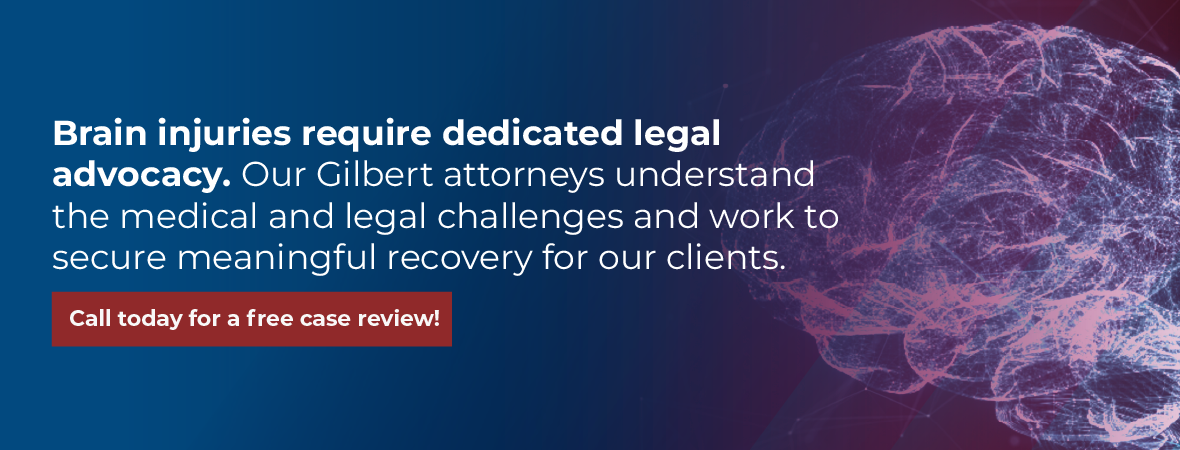Brain injuries can affect every part of your life, from your health to your ability to work. Contact our team at National Injury Help by calling 1 (800) 214-1010 today. We are here to support your recovery and fight for your future.
You are here because someone you love, or maybe you yourself, took a hard hit to the head and nothing has felt normal since. We understand how frightening that can be. Brain injuries turn simple moments like tying your shoes or remembering a phone number into challenges you never saw coming.
In Gilbert, those injuries often happen on crowded streets, busy construction sites, or everyday stairwells that should be safe. With our city growing fast, traffic on Loop 202 and US 60 only adds to the danger.
We are National Injury Help, and we focus on protecting brain-injury survivors throughout Gilbert and the East Valley. When a collision, fall, or workplace accident leaves you struggling with headaches, blurred vision, or mood swings, you need local legal support that moves quickly.
What Is a Brain Injury?
Before we dive into your legal options, we need to look at how doctors classify the damage itself. A clear grasp of these medical terms helps you explain your condition to insurers, judges, and even family members who still feel unsure about what you face.
Traumatic vs. Acquired Brain Injuries
A quick note before we break things apart: Every brain injury is serious, yet its causes differ.
- To begin, a traumatic brain injury (TBI) happens when an outside force hits the skull. Car crashes, football tackles, and sudden falls can all shake or pierce brain tissue.
- By contrast, an acquired brain injury (ABI) comes from events inside the body. Stroke, lack of oxygen, or serious infections cut off blood flow and harm brain cells without any direct blow.
Common Types of TBIs According to an Experienced Gilbert Brain Injury Attorney
Keep these specific trauma forms in mind when doctors discuss scans or reports:
- First comes a concussion, the most common TBI. It often causes brief confusion or dizziness, yet repeated concussions can stack up and create long-term problems.
- Next is a contusion, which is a bruise on the brain. Bleeding builds pressure and may require surgery.
- A diffuse axonal injury tears delicate nerve fibers. This can happen when your head whips forward and back at high speed.
- Finally, penetrating trauma occurs when an object breaks through the skull. Shards of metal or even a tool on a construction site can cause this life-threatening wound.
Severity Categories
Doctors label brain injuries as mild, moderate, or severe. Those words can mislead, so let us clarify.
- A mild injury still turns daily tasks upside down. You might feel foggy, sore, or irritable for weeks.
- A moderate injury often brings longer blackouts or memory gaps. Rehabilitation becomes part of your routine.
- A severe injury can change personality or mobility for life. Families may need to rearrange homes, jobs, and finances around ongoing care.
Symptoms and Consequences of Brain Injuries
Even minor head trauma can trigger wide-ranging effects. Knowing the full list prepares you to track changes and explain them during medical visits.
Physical Symptoms
A quick lead-in: your body often sends warnings before a scan shows damage.
- You may battle daily headaches that painkillers barely touch.
- Fatigue can drain your energy before noon.
- Blurred vision or light sensitivity makes reading and driving hard.
- Dizziness feels like the room spins whenever you stand up too fast.
Cognitive Impairment
Next, we turn to thinking skills, the hidden hurdles that frustrate many survivors.
- Memory loss can erase recent conversations within minutes.
- Confusion may make simple errands feel like puzzles.
- Speech issues lead to slow or slurred words.
- Poor concentration turns a ten-minute task into a one-hour struggle.
Emotional and Behavioral Changes
Now, let us look at mood, because brain chemistry shifts after injury.
- Irritability flares at small annoyances.
- Depression creeps in when progress feels slow.
- Anxiety rises before social events or doctor appointments.
- Mood swings can surprise friends and family who never saw you angry before.
Long-Term Consequences
- Some survivors cannot return to work or must switch careers.
- Lifetime care might include home nurses, therapists, and special equipment.
- Loss of independence forces hard conversations about driving, parenting, or even cooking alone.
Gilbert Brain Injury Attorney Explains Leading Causes of Brain Injuries in Gilbert
Understanding where and how brain injuries occur helps you collect evidence and strengthen your claim.
Car and Truck Accidents
Gilbert’s busiest roads create daily hazards.
- Loop 202, US 60, and Dobson Road see heavy traffic and high speeds.
- Whiplash or direct head impact can occur in rear-end collisions or side-swipes.
Motorcycle and Bicycle Accidents
Riders face unique risks and biased judgment, often being unfairly seen as reckless. In truth, many prioritize safety and take necessary precautions. Addressing these biases is essential for creating a safer, more inclusive environment for all road users.
- Helmets help, but cannot stop every skull fracture.
- A simple fall at low speed can still cause a severe concussion.
Slip and Fall Accidents
Seemingly safe spaces hide dangers.
- Grocery store aisles may have wet spots without warning signs.
- Cracked sidewalks and poorly lit stairwells trip pedestrians after dark.
Workplace Injuries
Job sites combine heavy tools, heights, and tight deadlines.
- Construction zones often lack secure scaffolding.
- Warehouse workers face falling boxes or forklift impacts.
Assault or Physical Violence
Sadly, intentional harm also creates serious TBIs.
- Bar fights or domestic incidents can involve blunt objects.
- Firearms or sharp weapons create penetrating injuries that require emergency surgery.
Gilbert Brain Injury Attorney Explains Arizona Law and Brain Injury Claims
At this point, you may wonder how state rules affect your recovery. We break it down in plain language.
Filing a Personal Injury Claim in Arizona
To win compensation, you must prove four points:
- Duty exists when someone has a legal responsibility to act with care.
- Breach occurs when that person fails to uphold the duty.
- Causation links the breach directly to your brain injury.
- Damages show the money you lost and the pain you still feel.
Statute of Limitations
Time moves quickly after a crash.
- Arizona gives you two years from the injury date to file suit.
- Delayed diagnoses or injuries to minors can extend that window, but waiting is risky.
Comparative Fault Rule
Even if you share blame, you still have rights.
- Your payout drops only by your percentage of fault.
- A driver who was 30% at fault can still recover 70% of the total damages.
Claims Against Government Entities
City or county negligence comes with extra hurdles.
- You must send a formal notice of claim within 180 days.
- You then have one year to file suit.
How a Gilbert Brain Injury Attorney Can Help
Going through a legal case after a brain injury can feel overwhelming. It is hard to focus on paperwork and deadlines when you are still dealing with dizziness, memory issues, therapy sessions, and doctor visits.
That is where we step in. Our goal is to carry the legal burden so that you can focus on healing. Whether your injury came from a car crash, a fall, or a workplace accident, we are here to guide you, protect your rights, and fight for the full compensation you deserve.
Here is a simple breakdown of how our team helps at every stage.
Free Consultation and Case Evaluation
The first step is always a free conversation. You can meet us at our office, talk with us over the phone, or ask us to visit you at home or in your hospital room. We want to make this as easy and comfortable as possible.
During this meeting, we:
- Listen to your story
- Ask questions about how the injury happened
- Look at your medical records and accident reports
- Discuss possible next steps in your legal journey
You do not need to bring anything fancy. Just be ready to share what happened. By the end of the consultation, you will understand whether you have a strong case and what kind of compensation might be available to you. We will also explain how long your case may take and what you can expect along the way.
Investigating the Injury and Building the Case
Once you decide to work with us, we get straight to work collecting evidence. The stronger the evidence, the higher the chance of winning a fair settlement.
Here is what we do:
- Work with medical experts: We hire neurologists, neuropsychologists, and therapists who understand brain injuries. They explain how your accident affected your memory, speech, emotions, and physical health. Their expert opinions carry weight in court and with insurance companies.
- Gather physical and digital evidence: We collect police reports, surveillance footage, photos of the accident scene, and crash data from vehicles. These details help show who was at fault and how the injury occurred.
- Interview witnesses: People who saw the accident can give important statements. We talk to them early, before memories fade.
Everything we collect helps prove not just how the accident happened, but also how it changed your life.
Negotiating with Insurance Companies
Most brain injuries do not leave visible scars. That is why some insurance companies try to downplay them. They might say your symptoms are “all in your head” or that you are exaggerating. Some even blame your memory problems or headaches on past issues, like stress or old sports injuries.
We know these tactics well, and we push back hard.
Here is how we deal with insurance companies:
- We prepare a strong demand letter backed by real medical evidence.
- We include MRI and CT scan results, doctor notes, and reports from specialists.
- We often create day-in-the-life videos that show how hard your daily routines have become. These visual stories help adjusters understand what you are going through.
- We handle all communication with the insurance company so that you do not have to. You can focus on recovery while we fight for you.
Most cases settle outside of court, but we never accept a low offer just to close the case. You deserve full and fair compensation for what you are going through.
Preparing for Court If Needed
Sometimes insurance companies refuse to make a fair offer. If that happens, we are fully ready to take your case to court. We file a lawsuit in Maricopa County Superior Court and walk you through each step.
Here is what we do in the litigation phase:
- File the complaint: This is the official document that starts the lawsuit. It explains who is being sued and why.
- Serve all parties: We make sure the other side receives the paperwork and knows they must respond.
- Handle discovery: This is when both sides exchange evidence. We request documents, ask questions, and take depositions.
- Use expert testimony: We bring in medical experts to talk about your injury, treatment, and what care you will need in the future. This helps juries understand why your injury matters and why the cost of care will be ongoing.
Our trial lawyers are experienced and fully prepared. If we go to court, we will make sure your case is told clearly and powerfully.
What Compensation Can You Receive in a Brain Injury Case?
A head trauma claim in Gilbert allows you to recover different types of damages. These fall into three main categories: economic damages, non-economic damages, and, in some cases, punitive damages. Let’s take a closer look at what each means and how they work.
Medical Expenses
Brain injuries often lead to expensive emergency room visits, surgeries, CT scans, MRIs, and medications. In many cases, people need long-term physical therapy, occupational therapy, and speech therapy. You may also need in-home nursing care, mobility equipment, or follow-up appointments with specialists.
All of these costs fall under medical expenses. You can claim both current bills and future medical needs that your doctors believe will be necessary as part of your recovery.
Lost Wages
If your injury forced you to miss work, you can claim the income you lost during that time. This includes regular paychecks, missed bonuses, and even unused vacation or sick days.
If your brain injury affects your ability to work in the future, you may also claim the income you would have earned over the rest of your career. This is called lost earning capacity. An economist or vocational expert may help calculate this amount based on your job history, age, and expected career path.
Other Out-of-Pocket Costs
Economic damages may also include costs for things like:
- Transportation to and from medical appointments
- Home modifications, such as ramps or bathroom upgrades
- Medical equipment, like walkers, braces, or speech aids
- Professional caregiving or household help
If you have receipts or estimates for these expenses, your attorney can include them in your claim.
Pain and Suffering
This refers to the physical and emotional pain caused by the injury. It includes things like chronic headaches, dizziness, or fatigue that interrupt your daily life. It also includes the discomfort and pain of surgeries, physical therapy, and other treatments.
Emotional Distress
Brain injuries often affect more than just the body. Many people struggle with anxiety, depression, mood swings, or emotional outbursts. You may feel frustrated or embarrassed by changes in your memory, speech, or behavior.
These emotional struggles can affect your relationships with family and friends. You may feel isolated or misunderstood. Non-economic damages seek to compensate you for that emotional burden.
Loss of Enjoyment of Life
This covers the loss of the activities and experiences that once brought you joy. You might no longer be able to play a sport you loved, enjoy your hobbies, or participate in family outings. If your injury has taken away your ability to enjoy life as you once did, this category allows you to claim compensation for that loss.
Loss of Companionship or Support
If you are a spouse, parent, or child, and your relationship has changed because of the injury, the law allows you to claim loss of companionship or support. This includes loss of emotional support, affection, and care that the injured person used to provide.
Punitive Damages
Punitive damages are not awarded in every case. They are only given when the person or company that caused the injury acted with extreme carelessness or intentional harm.
For example, if a drunk driver ran a red light at high speed and caused the crash, a court may choose to punish that person by awarding additional damages to the injured victim. These damages are meant to send a message that such behavior is unacceptable and to discourage others from doing the same.
Punitive damages are not tied to medical bills or pain. They are about punishing the wrongdoer and holding them fully accountable.
What Affects the Value of a Brain Injury Settlement?
Many different factors influence how much money you can recover in a brain injury claim. Some of the most important include:
- The severity of the injury
- Whether doctors expect a full or partial recovery
- The total cost of past and future medical treatment
- How much income have you lost and will continue to lose
- The strength of medical and legal evidence
- Expert testimony about your condition and needs
- How clearly can fault be proven
- The willingness of the insurance company to negotiate fairly
The more solid your evidence, the stronger your claim. Medical records, expert reports, and personal testimony all play a role in proving your case.
What to Do After a Brain Injury in Gilbert
Early actions protect both health and legal claims.
Seek Immediate Medical Help
Seconds matter when brain cells lack oxygen.
- Banner Desert Medical Center and Mountain Vista Medical Center offer top imaging tools.
- Prompt diagnosis ties symptoms directly to the accident for insurers to see.
Document the Incident
Photos and notes lock details in time.
- Capture vehicle damage, skid marks, or a slippery floor.
- Gather names and contacts of anyone who saw what happened.
Keep Records
Save every receipt and letter.
- Therapy logs show progress and setbacks.
- Emails with insurers reveal low-ball tactics.
Contact a Brain Injury Lawyer Promptly
Legal help gets tougher to find as deadlines shrink.
- Early involvement lets us secure security-camera footage before it is erased.
- We handle insurer calls so you can focus on medical appointments.
Why Choose a Gilbert-Based Brain Injury Attorney
Local roots bring unique benefits.
Local Knowledge
We drive the same streets you do.
- We know the crash zones of the area
- We work closely with Gilbert PD and local investigators.
Convenient and Responsive Communication
Distance should never block updates.
- You can meet us in person within minutes, not hours.
- We answer calls quickly because we share the same time zone and community events.
Dedicated, Client-Focused Representation
You deserve personal attention.
- We keep caseloads manageable so each client gets direct attorney contact.
- We never pass you off to distant subcontractors.
FAQs About Brain Injury Claims in Gilbert
How do I prove a brain injury if symptoms appeared weeks later?
We use doctor testimony, MRI scans, and witness statements to connect the dots.
Can I sue if the injury happened at work?
Yes, you can sue if the injury happened at work. You may have both a workers’ comp claim and a separate suit against a negligent third party.
What if I was partly responsible for the accident?
Even if you were partly responsible for the accident, Arizona’s comparative fault still lets you recover whatever share matches the other party’s blame.
How long does a brain injury claim take?
Simple cases may settle in months, but complex injuries often require a year or more to reach fair value.
Can I afford a lawyer if I am out of work?
Yes, even if you are out of work at the moment, you can afford a lawyer. With our contingency fee basis, you pay nothing up front, and nothing at all unless we win money for you.
Contact a Gilbert Brain Injury Attorney Today
A brain injury can change everything in an instant. From medical bills to long-term care, the road ahead may feel overwhelming, but you don’t have to face it alone.
At National Injury Help, we understand the physical, emotional, and financial toll these injuries bring. That’s why we offer free consultations and no upfront fees. You only pay if we win your case.
We serve individuals and families throughout Gilbert, Mesa, Tempe, Chandler, and Queen Creek, providing legal support grounded in care, clarity, and commitment.
If you or someone you love has suffered a brain injury in Gilbert, call us today at 1 (800) 214-1010. We’ll listen to your story, explain your options in plain language, and begin building a strong case on your behalf. You focus on recovery, we’ll take care of the legal fight.





